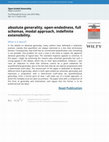Papers by Filippo Costantini

Theoria (Wiley), volume 90, Issue 12, 2024
This paper analyses the abstractionist account of quantity championed by Leibniz, especially in t... more This paper analyses the abstractionist account of quantity championed by Leibniz, especially in the 1680s. Leibniz intro- duced the notion of quantity in an indirect way, via an abstraction principle. In the first part of the paper, I identify the context in which this approach arose in light of Leibniz’s criticism of his earlier dream of an ‘alphabet of human thought’. Recognising the impossibility of such a project led him to realise that, when dealing with terms referring to abstract objects, we should always consider them within the true sentences in which they occur. In the second part, I describe this approach in detail. This allows us to look at some key concepts of Leibniz’s theory of quantity. In particular, I raise the problem of the relationship between the two sides of the abstraction principle: how should we think of the relation between the claim that a and b are equal, and the claim that the quantity of a is identical to the quantity of b? I argue that we can find a positive answer to this problem in Leibniz.

Global Philosophy, 2023
Free available here: https://link.springer.com/article/10.1007/s10516-023-09665-3
The paper deal... more Free available here: https://link.springer.com/article/10.1007/s10516-023-09665-3
The paper deals with Leibniz’s ontology and the metaphysics of the aggregate. Concerning the ontology of aggregates, the main aim is to provide a new argument in favor of the claim that an aggregate and its constituents have the same ontological import. This argument takes the form of a weakening of a principle known in the contemporary literature of mereology as ‘composition as identity’ (CAI). The paper shows that Leibniz’s nominalism toward aggregates is a direct consequence of two elements: the way in which he considers the relationship between aggregates and their constituents in his logical calculus; and his theory of identity (and more
generally, equivalence relations) as providing us with the ground for substitution salva veritate. It is concluded that Leibniz is committed to a principle that the author dubs Ontological-CAI: the aggregate/whole is ontologically identical (i.e. it has the same ontological import) as its constituents/parts. Concerning the metaphysics of aggregates, the paper outlines in what sense aggregates are grounded on their constituents:
arguing that Leibniz is committed to a further principle that the author
calls Metaphysical-CAI: the aggregate/whole is metaphysically grounded on its constituents/parts. From this it can be understood in which sense Leibniz could be considered a mereological nihilist, and in which sense not. The paper also sets out two different and competing readings of Metaphysical-CAI, and argues that Leibniz accepted both of them by interpreting them as different levels of explanation of the nature of aggregates.
The Leibniz Review
This paper won the 2022 Leibniz Society of North America Essay Competition.
This paper deals wit... more This paper won the 2022 Leibniz Society of North America Essay Competition.
This paper deals with the metaphysics of the notion of quantity in the philosophy of Leibniz, and its aim is to defend the following bi-conditional: for any object x, x has a certain quantity if and only if x has a (metaphysical) limit or a bound. The direction from left to right is justified in §3, while in §4 I develop an argument to justify the direction from right to left. Since the bi-conditional links the metaphysical notion of limit to the mathematical notion of quantity (and I this way it links Leibniz’s metaphysics with his conception of Mathesis Universalis), it allows the use of metaphysics to clarify the features of his mathematical notion of quantity. This task is accomplished in §5 and §6. Finally, §7 discusses a possible objection.

JOLMA. The Journal for the Philosophy of Language, Mind and the Arts, 2021
This paper discusses Leibniz's treatment of the term 'nihil' that appears in some logical papers ... more This paper discusses Leibniz's treatment of the term 'nihil' that appears in some logical papers about the notion of Real Addition. First, the paper argues that the term should be understood as an empty (singular) term and that sentences with empty terms can be true (§2). Second, it sketches a positive free logic to describe the logical behaviour of empty terms (§3). After explaining how this approach avoids a contradiction that threatens the introduction of the term 'nihil' in the Real Addition calculus (§4), and how this approach should be understood within Leibniz's philosophy (§5), the paper assesses the prospects of such an approach with regard to two fundamental issues in Leibniz's thought: the fictional nature of infinitesimals (§6), and the occurrence of the term 'nothing' in the proof of the existence of God that we find in the New Essays (§7).
Eternity & Contradiction. Journal of Fundamental Ontology, 2021
This paper analyzes and criticizes Emanuele Severino's resolution of the aporia of nothingness. S... more This paper analyzes and criticizes Emanuele Severino's resolution of the aporia of nothingness. Severino's solution consists in two theses: A) the meaning of 'nothingness' is self-contradictory; B) the determinate content of the meaning of nothingness is consistent (it does not imply by itself any contradiction). After distinguishing three possible interpretations of the term 'nothing' (as a quantifier, as a noun-phrase, and as a concept), the paper argues that there is no interpretation that makes both theses A) and B) simultaneously true. This shows that Severino's formulation and resolution of the problem of nothingness is untenable; moreover, it is shown that his resolution is based on an ambiguity between the nounphrase and the concept interpretation.

Eternity & Contradiction. Journal of Fundamental Ontology, 2020
In my paper ‘Elenchos Come Petitio Principii’, I argued that Severino’s elenctic argument does no... more In my paper ‘Elenchos Come Petitio Principii’, I argued that Severino’s elenctic argument does not work against a dialetheist position such as the one defended by Graham Priest. In the present paper, I will focus on some fundamental aspects of the dialetheist’s challenge to the Law of Non Contradiction that have raised many doubts, such as the claim that a true contradiction is at the same time false, or the fact that the dialetheist’s metatheory should be as inconsistent as the object theory. Moreover, I shall exploit such clarifications to reexpose some of the key passages of my critique of the elenctic strategy, in particular those regarding the second figure of elenchos. Finally, I shall reply to the objection that accuses both dialetheism and my own view of not providing incontrovertible grounds to their respective claims.
Philosophia (Springer), 2020
In this paper we offer a new solution to the old paradox of nothingness. This new solution develo... more In this paper we offer a new solution to the old paradox of nothingness. This new solution develops in two steps. The first step consists in showing how to resolve the contradiction generated by the notion of nothingness by claiming that the contradiction shows the indefinite extensibility of the concept of object. The second step consists in showing that, having accepted the idea of indefinite extensibility, we can have absolute generality without the emergence of the contradiction connected to the absolute notion of nothingness. The idea of indefinite extensibility allows us to have our cake (absolute generality) and to eat it too (avoid commitment to a contradictory notion of nothingness).
History of Philosophy and Logical Analysis , 2019
This paper deals with Leibniz’s well-known reductio argument against the infinite number. I will ... more This paper deals with Leibniz’s well-known reductio argument against the infinite number. I will show that while the argument is in itself valid, the assumption that Leibniz reduces to absurdity does not play a relevant role. The last paragraph of the paper reformulates the whole Leibnizian argument in plural terms (i.e. by means of a plural logic) to show that it is possible to derive the contradiction that Leibniz uses in his argument even in the absence of the premise that he refutes.
Rivista di Filosofia Neo-Scolastica, 2018
The paper argues that the elenctic argument in defence of the Law of Non-contradiction is a Petit... more The paper argues that the elenctic argument in defence of the Law of Non-contradiction is a Petitio Principii. In the first part of the paper, Emanuele Severino’s development of an elenctic strategy in Ritornare a Parmenide is examined and compared with Graham Priest’s defence of the truth of some contradictions. The fundamental reason why the elenctic strategy begs the question is that, in order to work, it exactly presupposes that account of negation which is challenged by the friends of contradictions like Priest. In the second part, the traditional idealistic argument against the existence of the “Thing in itself” is shown to suffer from the same problem.

Kriterion - Journal of Philosophy, 2018
In this paper, we offer a contribution to the discussion of one of the most important objections ... more In this paper, we offer a contribution to the discussion of one of the most important objections against a relativist position in the absolute generality debate. The inexpressibility objection accuses the generality-relativist of not being able to coherently express her own position. First, we examine Glanzberg's attempt to reply to this objection and we show that it fails. Second, we study the prospects of generalizing the relativist position. In particular, we analyze Fine's and Linnebo's modal approaches and we argue that, even though they are able to coherently express one of the core ideas of relativism while avoiding the inexpressibility objection, there is an important sense in which they are no longer relativist positions. Third, while strengthening the idea that the inexpressibility objection does succeed, we argue that this is no guarantee of the falsity of relativism. Relativism may be inexpressible but true. However, we stress that even if the inexpressibility objection does not supply a definitive, knock-down objection against relativism, if we want to discuss relativism in a rational way, the objection offers a compelling reason not to embrace generality-relativism.

The Philosophical Forum, Inc., 2018
In the debate on absolute generality, many authors have defended a relativistic position, namely ... more In the debate on absolute generality, many authors have defended a relativistic position, namely that quantiiers are always restricted to a less than all-inclusive domain. Consequently, they hold that an unrestricted quantiication over everything is not possible. One problem for such a view is the need to explain the apparent absolute generality of logical laws. The standard response appeals to schemas. In this paper, I begin by examining the reasons why schematic generality has such a strong appeal in this debate, which rely on their open-endedness. However, I also raise an objection to show that schemas cannot be a good substitute for quantiicational generality, due to the fact that they do not express propositions with a determined truth-value. The second part of the paper is dedicated to develop a different kind of generality, which is both open-ended (as schematic generality) and expresses a proposition with a determined truth-value (as quantificational generality). From a formal point of view, I will make use of a modal approach, in which the modality must be taken as primitive. The paper ends with a comparison of this form of generality and schematism, and argues that the former is to be preferred over the latter.
Discipline Filosofiche, XXVI, 2, 2016
The aim of this paper is to understand the meaning of dialectical contradiction. I shall argue th... more The aim of this paper is to understand the meaning of dialectical contradiction. I shall argue that dialectics is mainly a linguistic phenomenon that shows the coimplication of concepts. Through a deep analysis of the notions of “contradiction” and “negation”, which lie behind Hegel’s and Adorno’s work, I shall explain the logical structure of the contradiction which Hegel and Adorno work with (§ 1); I shall show why Hegel and Adorno give two radically different interpretations of contradiction (§ 2 and § 3); why Adorno’s idea of dialectics, as showing the presence of a transcendent “nonidentical”, is not sustainable (§ 4); and, finally, that Adorno’s conception of a purely negative dialectics requires a linguistic interpretation (§ 5).
Books by Filippo Costantini

Che cos'è un insieme? Esistono insiemi infiniti? È possibile contare l'infi nito e condurre con e... more Che cos'è un insieme? Esistono insiemi infiniti? È possibile contare l'infi nito e condurre con esso operazioni matematiche? Qual è il significato dei paradossi logici che scossero i fondamenti della riflessione filosofica sulla matematica? Il libro tenta di rispondere a queste (e altre) domande tramite una dettagliata ana-lisi della teoria degli insiemi: a partire da Bernard Bolzano, colui che per primo introdusse il termine " insieme " in matematica, fino a Georg Cantor, riconosciuto unanimemente come il padre della teoria. Un capitolo è poi dedicato alla svolta assiomatica di inizio Novecento. Limitando all'essenziale la parte tecnica, ci si soffermerà sui presupposti filosofi ci della teoria, per mostrare come le grandi idee matematiche siano strettamente intrecciate a quelle filosofiche. Si discuteranno poi i paradossi logici che affliggono la teoria ingenua degli insiemi, evidenziando quanto una riflessione adeguata su di essi sia non solo necessaria nel dibattito contemporaneo in ambito logico-matematico, ma sia fruttuosa anche per chiarire aspetti essenziali del linguaggio ordinario.

For a long time forgotten, in the last few years dialectical thinking has been paid again great a... more For a long time forgotten, in the last few years dialectical thinking has been paid again great attention. In recent times dialectics has been resumed by and applied to philosophical debates in the Anglo-American scene, as the influential examples of John McDowell and Robert Brandom clearly show. Furthermore, it seems that dialectics is enjoying today widespread appreciation even outside of the specific domain of philosophy, as testified by some developments in the human sciences and, for example, in the realm of psychotherapy with the creation of “Dialectical Behavior Therapy” (DBT) by Marsha M. Linehan.
Among the main protagonists of contemporary philosophy who carefully and intensely dealt with dialectics, Theodor W. Adorno must be surely mentioned. In the last decade, the in-ternational philosophical community seems to have realized again how important and indeed essential his theoretical contribution has been and still is. The publication of previously unpublished writings of the Frankfurter thinker, edited by the Theodor W. Adorno Archiv, has probably contributed to the renewed interest in Adorno’s philosophy. Among these unpublished works, some of his lec-ture courses are of greatest importance, such as those on Aesthetics (1958-59), on Kant’s Critique of Pure Reason (1959), on the Problems of Moral Philosophy (1963), and on Metaphysics (1965). The aim of this issue of “Discipline filosofiche” is to explore how Adorno contributed to the development of dialectical thinking by outlining an original kind of negative dialectics; and in particular to analyze the decisive role played by the question concerning truth that Adorno also (but not only) explored with regard to the “truth content” of art, and always (i.e. even outside of aesthetic theory) with reference to the fundamental “enigmatic character” of truth.
Contents:
- Giovanni Matteucci, Stefano Marino, Presentazione
- Stefano Marino, Giovanni Matteucci, The Dark Side of the Truth. Nature and Natural Beauty in Adorno
- Josef Fruchtl, Tell Me Lies, and Show Me Invisible Images! Adorno’s Criticism on Film – Revisited
- Tom Huhn, The Enigma of Experience; Art and Truth Content
- Giuseppe Di Giacomo, Form, Appearance, Testimony: Reflections On Adorno’s Aesthetics
- Samir Gandesha, Adorno’s Reading of Endgame: Between Autonomy and Authenticity
- Fabrizio Desideri, Ratio, Mimesis, Dialectics: On Some Motifs in Theodor W. Adorno
- Giovanni Zanotti, Contingent Antagonism. A Key to Adorno’s Dialectic
- Paolo A. Bolaños, The Promise of the Non-Identical: Adorno’s Revaluation of the Language of Philosophy
- Filippo Costantini, Cosa mostra la dialettica? Contraddizione, negazione e non identità in Hegel e Adorno
- Giacomo Fronzi, Dialettica negativa, metafisica e intersoggettività. Una lettura relazionale del pensiero di Th.W. Adorno
- Pietro Terzi, Critica e decostruzione dell’immediato. Adorno e Derrida di fronte a Husserl
Book Reviews by Filippo Costantini
The New Yearbook for Phenomenology and Phenomenological Philosophy, , 2019
Philosophical Reading, 2015
Workshops by Filippo Costantini
10 am-11.15 am (EST) / 4 pm-5.15 pm (CET) Arilès Remaki (Laboratoire SPHere, Paris) Mereology in ... more 10 am-11.15 am (EST) / 4 pm-5.15 pm (CET) Arilès Remaki (Laboratoire SPHere, Paris) Mereology in the Dissertatio de Arte Combinatoria and the epistemic limits it implies
Conference Organization by Filippo Costantini
Life, soul, vitalism, and plants in Leibniz.
Workshop in Venice, March 23, 2023
Attendance is fr... more Life, soul, vitalism, and plants in Leibniz.
Workshop in Venice, March 23, 2023
Attendance is free, registration is necessary











Uploads
Papers by Filippo Costantini
The paper deals with Leibniz’s ontology and the metaphysics of the aggregate. Concerning the ontology of aggregates, the main aim is to provide a new argument in favor of the claim that an aggregate and its constituents have the same ontological import. This argument takes the form of a weakening of a principle known in the contemporary literature of mereology as ‘composition as identity’ (CAI). The paper shows that Leibniz’s nominalism toward aggregates is a direct consequence of two elements: the way in which he considers the relationship between aggregates and their constituents in his logical calculus; and his theory of identity (and more
generally, equivalence relations) as providing us with the ground for substitution salva veritate. It is concluded that Leibniz is committed to a principle that the author dubs Ontological-CAI: the aggregate/whole is ontologically identical (i.e. it has the same ontological import) as its constituents/parts. Concerning the metaphysics of aggregates, the paper outlines in what sense aggregates are grounded on their constituents:
arguing that Leibniz is committed to a further principle that the author
calls Metaphysical-CAI: the aggregate/whole is metaphysically grounded on its constituents/parts. From this it can be understood in which sense Leibniz could be considered a mereological nihilist, and in which sense not. The paper also sets out two different and competing readings of Metaphysical-CAI, and argues that Leibniz accepted both of them by interpreting them as different levels of explanation of the nature of aggregates.
This paper deals with the metaphysics of the notion of quantity in the philosophy of Leibniz, and its aim is to defend the following bi-conditional: for any object x, x has a certain quantity if and only if x has a (metaphysical) limit or a bound. The direction from left to right is justified in §3, while in §4 I develop an argument to justify the direction from right to left. Since the bi-conditional links the metaphysical notion of limit to the mathematical notion of quantity (and I this way it links Leibniz’s metaphysics with his conception of Mathesis Universalis), it allows the use of metaphysics to clarify the features of his mathematical notion of quantity. This task is accomplished in §5 and §6. Finally, §7 discusses a possible objection.
Books by Filippo Costantini
Among the main protagonists of contemporary philosophy who carefully and intensely dealt with dialectics, Theodor W. Adorno must be surely mentioned. In the last decade, the in-ternational philosophical community seems to have realized again how important and indeed essential his theoretical contribution has been and still is. The publication of previously unpublished writings of the Frankfurter thinker, edited by the Theodor W. Adorno Archiv, has probably contributed to the renewed interest in Adorno’s philosophy. Among these unpublished works, some of his lec-ture courses are of greatest importance, such as those on Aesthetics (1958-59), on Kant’s Critique of Pure Reason (1959), on the Problems of Moral Philosophy (1963), and on Metaphysics (1965). The aim of this issue of “Discipline filosofiche” is to explore how Adorno contributed to the development of dialectical thinking by outlining an original kind of negative dialectics; and in particular to analyze the decisive role played by the question concerning truth that Adorno also (but not only) explored with regard to the “truth content” of art, and always (i.e. even outside of aesthetic theory) with reference to the fundamental “enigmatic character” of truth.
Contents:
- Giovanni Matteucci, Stefano Marino, Presentazione
- Stefano Marino, Giovanni Matteucci, The Dark Side of the Truth. Nature and Natural Beauty in Adorno
- Josef Fruchtl, Tell Me Lies, and Show Me Invisible Images! Adorno’s Criticism on Film – Revisited
- Tom Huhn, The Enigma of Experience; Art and Truth Content
- Giuseppe Di Giacomo, Form, Appearance, Testimony: Reflections On Adorno’s Aesthetics
- Samir Gandesha, Adorno’s Reading of Endgame: Between Autonomy and Authenticity
- Fabrizio Desideri, Ratio, Mimesis, Dialectics: On Some Motifs in Theodor W. Adorno
- Giovanni Zanotti, Contingent Antagonism. A Key to Adorno’s Dialectic
- Paolo A. Bolaños, The Promise of the Non-Identical: Adorno’s Revaluation of the Language of Philosophy
- Filippo Costantini, Cosa mostra la dialettica? Contraddizione, negazione e non identità in Hegel e Adorno
- Giacomo Fronzi, Dialettica negativa, metafisica e intersoggettività. Una lettura relazionale del pensiero di Th.W. Adorno
- Pietro Terzi, Critica e decostruzione dell’immediato. Adorno e Derrida di fronte a Husserl
Book Reviews by Filippo Costantini
Workshops by Filippo Costantini
Conference Organization by Filippo Costantini
Workshop in Venice, March 23, 2023
Attendance is free, registration is necessary
The paper deals with Leibniz’s ontology and the metaphysics of the aggregate. Concerning the ontology of aggregates, the main aim is to provide a new argument in favor of the claim that an aggregate and its constituents have the same ontological import. This argument takes the form of a weakening of a principle known in the contemporary literature of mereology as ‘composition as identity’ (CAI). The paper shows that Leibniz’s nominalism toward aggregates is a direct consequence of two elements: the way in which he considers the relationship between aggregates and their constituents in his logical calculus; and his theory of identity (and more
generally, equivalence relations) as providing us with the ground for substitution salva veritate. It is concluded that Leibniz is committed to a principle that the author dubs Ontological-CAI: the aggregate/whole is ontologically identical (i.e. it has the same ontological import) as its constituents/parts. Concerning the metaphysics of aggregates, the paper outlines in what sense aggregates are grounded on their constituents:
arguing that Leibniz is committed to a further principle that the author
calls Metaphysical-CAI: the aggregate/whole is metaphysically grounded on its constituents/parts. From this it can be understood in which sense Leibniz could be considered a mereological nihilist, and in which sense not. The paper also sets out two different and competing readings of Metaphysical-CAI, and argues that Leibniz accepted both of them by interpreting them as different levels of explanation of the nature of aggregates.
This paper deals with the metaphysics of the notion of quantity in the philosophy of Leibniz, and its aim is to defend the following bi-conditional: for any object x, x has a certain quantity if and only if x has a (metaphysical) limit or a bound. The direction from left to right is justified in §3, while in §4 I develop an argument to justify the direction from right to left. Since the bi-conditional links the metaphysical notion of limit to the mathematical notion of quantity (and I this way it links Leibniz’s metaphysics with his conception of Mathesis Universalis), it allows the use of metaphysics to clarify the features of his mathematical notion of quantity. This task is accomplished in §5 and §6. Finally, §7 discusses a possible objection.
Among the main protagonists of contemporary philosophy who carefully and intensely dealt with dialectics, Theodor W. Adorno must be surely mentioned. In the last decade, the in-ternational philosophical community seems to have realized again how important and indeed essential his theoretical contribution has been and still is. The publication of previously unpublished writings of the Frankfurter thinker, edited by the Theodor W. Adorno Archiv, has probably contributed to the renewed interest in Adorno’s philosophy. Among these unpublished works, some of his lec-ture courses are of greatest importance, such as those on Aesthetics (1958-59), on Kant’s Critique of Pure Reason (1959), on the Problems of Moral Philosophy (1963), and on Metaphysics (1965). The aim of this issue of “Discipline filosofiche” is to explore how Adorno contributed to the development of dialectical thinking by outlining an original kind of negative dialectics; and in particular to analyze the decisive role played by the question concerning truth that Adorno also (but not only) explored with regard to the “truth content” of art, and always (i.e. even outside of aesthetic theory) with reference to the fundamental “enigmatic character” of truth.
Contents:
- Giovanni Matteucci, Stefano Marino, Presentazione
- Stefano Marino, Giovanni Matteucci, The Dark Side of the Truth. Nature and Natural Beauty in Adorno
- Josef Fruchtl, Tell Me Lies, and Show Me Invisible Images! Adorno’s Criticism on Film – Revisited
- Tom Huhn, The Enigma of Experience; Art and Truth Content
- Giuseppe Di Giacomo, Form, Appearance, Testimony: Reflections On Adorno’s Aesthetics
- Samir Gandesha, Adorno’s Reading of Endgame: Between Autonomy and Authenticity
- Fabrizio Desideri, Ratio, Mimesis, Dialectics: On Some Motifs in Theodor W. Adorno
- Giovanni Zanotti, Contingent Antagonism. A Key to Adorno’s Dialectic
- Paolo A. Bolaños, The Promise of the Non-Identical: Adorno’s Revaluation of the Language of Philosophy
- Filippo Costantini, Cosa mostra la dialettica? Contraddizione, negazione e non identità in Hegel e Adorno
- Giacomo Fronzi, Dialettica negativa, metafisica e intersoggettività. Una lettura relazionale del pensiero di Th.W. Adorno
- Pietro Terzi, Critica e decostruzione dell’immediato. Adorno e Derrida di fronte a Husserl
Workshop in Venice, March 23, 2023
Attendance is free, registration is necessary